Blog Details
- Home
- Blog Details

EV Battery Safety: Common Myths and Facts
In an age of environmental consciousness and rapid technological advancements, electric vehicles (EVs) have become a symbol of a greener, more sustainable future. Central to the success of these vehicles are their lithium-ion batteries, which power everything from compact electric cars to heavy-duty commercial EVs. While these batteries have undoubtedly revolutionized the automotive industry, there are still lingering myths and misconceptions regarding their safety. Elint Exim Pvt Ltd., a leading manufacturer of lithium-ion batteries for electric vehicles, is here to dispel these myths and provide you with the facts about EV battery safety.
Myth #1: Lithium-ion Batteries Are Highly Explosive
Fact: Lithium-ion batteries are designed with multiple safety features to prevent explosions. While rare incidents have occurred, they are often due to external factors, such as physical damage or improper charging. Modern lithium-ion batteries have advanced management systems that monitor temperature and voltage, ensuring safe operation. Elint Exim's batteries are rigorously tested to meet stringent safety standards, making them as safe as possible.
Myth #2: Electric Vehicle Batteries Have a Short Lifespan
Fact: The lifespan of an EV battery largely depends on usage and maintenance. On average, lithium-ion batteries can last between 8 to 15 years or longer. Factors like temperature, charging habits, and the quality of the battery itself can significantly impact longevity. Elint Exim's batteries are designed for durability and longevity, offering high-quality products to ensure a longer battery lifespan.
Myth #3: Charging an EV Battery at Any Time Will Cause Damage
Fact: Modern EVs are equipped with smart charging systems that prevent overcharging and over-discharging. You can safely plug in your EV whenever it's convenient. Partial charging or topping off is also acceptable and does not affect the battery's health. However, consistent deep discharges should be avoided, as they can accelerate wear. Elint Exim batteries are built with protective circuits to maintain safe charging and discharging.
Myth #4: Electric Vehicle Batteries Are Harmful to the Environment
Fact: While it's true that lithium-ion batteries require mining and manufacturing processes, their overall environmental impact is significantly lower than that of traditional internal combustion engines. EVs produce zero tailpipe emissions and help reduce greenhouse gas emissions. Furthermore, recycling programs are in place to reclaim valuable materials from retired batteries, reducing waste. Elint Exim is committed to eco-friendly battery production and recycling efforts.
Myth #5: Electric Vehicle Batteries Can Catch Fire Easily
Fact: Lithium-ion battery fires are extremely rare. They typically occur under extreme conditions, such as severe accidents or punctures. EV manufacturers have implemented extensive safety measures to prevent thermal runaway, including fire-resistant battery enclosures and cooling systems. Elint Exim's batteries are manufactured with the utmost attention to safety standards and are rigorously tested for thermal management.
Myth #6: It's Unsafe to Drive an Electric Vehicle in the Rain
Fact: Electric vehicles are designed to be safe in various weather conditions, including rain. Just like traditional vehicles, EVs have sealed components and electrical systems to prevent water ingress. In fact, EVs often have a lower center of gravity, which can enhance stability in wet conditions. Elint Exim's batteries are designed to be water-resistant, ensuring safety and reliability.
Myth #7: Electric Vehicle Batteries Degrade Rapidly
Fact: All batteries experience some level of degradation over time. However, modern lithium-ion batteries are designed to minimize this effect. Regular maintenance, proper charging practices, and temperature control can significantly slow down degradation. Elint Exim's batteries are manufactured with advanced technology to reduce degradation and provide long-lasting performance.
Myth #8: Disposing of Electric Vehicle Batteries Is Harmful to the Environment
Fact: The proper disposal and recycling of lithium-ion batteries are essential for minimizing environmental impact. Recycling centers recover valuable materials like lithium, cobalt, and nickel, reducing the need for mining. Elint Exim actively promotes battery recycling and disposal programs to ensure responsible environmental stewardship.
Myth #9: Electric Vehicle Batteries Are Heavy and Unstable
Fact: While lithium-ion batteries are denser than traditional lead-acid batteries, they are designed to be lightweight and stable. Their weight is distributed evenly across the vehicle's chassis, enhancing stability. Advanced battery management systems and design principles ensure safe handling and operation. Elint Exim's batteries are engineered for optimal weight distribution and safety.
Myth #10: EV Battery Technology Hasn't Improved Much Over the Years
Fact: Battery technology has advanced significantly in recent years, and it continues to evolve. New materials, manufacturing techniques, and designs have led to higher energy density, faster charging, and longer lifespans. Elint Exim is at the forefront of these advancements, consistently improving its battery products to meet the demands of the ever-growing EV market.
In conclusion, the safety of lithium-ion batteries for electric vehicles is a top priority for manufacturers like Elint Exim Pvt Ltd. While myths and misconceptions persist, the facts reveal that EV batteries are designed with multiple safety features, long lifespans, and environmental considerations in mind. By staying informed and adopting best practices, you can enjoy the many benefits of electric vehicles while minimizing potential risks. Electric vehicles are the future, and with the right knowledge, you can confidently embrace this sustainable mode of transportation.

